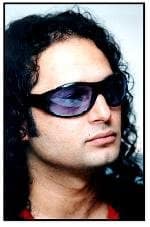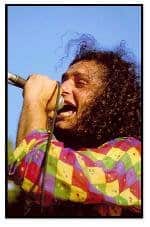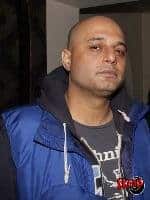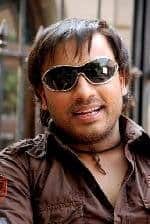Ali Azmat Pakistani Rock Singer
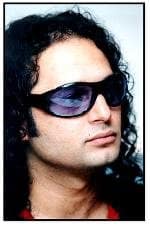
Ali Azmat was born on April 20th, 1970 in Abbottabad. He is a Pakistani musician, who gained recognition as the lead vocalist of the pop/rock band Junoon.
Early career
Azmat grew up in Lahore, which he credits for his unconventional attitude. He went to Australia for his higher studies, but due to financial difficulties he returned to Pakistan before completing university. His first band ‘Jupiters’ was known for performing covers at small gigs, such as weddings, in Lahore. While with them, Azmat wrote his legendary hit song Dosti. He later sang and recorded Dosti with Junoon, after which the song gained national fame.
Junoon
Junoon was Pakistan’s biggest band famous for combining traditional poetry and instruments with rock music. Azmat was the lead vocalist of the band. With Junoon, he toured extensively, doing two North American tours a year since 1992. He performed in Europe, the Middle East and China and at the European rock festival, Roskilde in June 2000. He left Junoon in 2005 to pursue a solo career.
Solo career
Ali Azmat released his first solo album, Social Circus, in March 2005 to critical acclaim. Social Circus was a massive departure from Junoon’s style and won 23 awards in Pakistan, including Best Album and Best Producer. In India, Azmat was nominated for Best Soundtrack and Best Song at the Sahara Awards held in London, for his single “Garaj Baras” in the Pooja Bhatt film Paap. Azmat’s second album, Klashinfolk, was released in August 2008 and recorded at Mekaal Hasan Studios in Lahore. Klashinfolk also received significant critical acclaim across Pakistan, although (like Social Circus) it was not a huge commercial success.
Bollywood
The hit song Sayooni was chosen by Azmat to be used for his debut as a Bollywood music director and singer. He also signed for one of Rahul Dholakia’s episode on Mumbai-11 and the film, Tera Kya Hoga Johnny, which was directed by Sudhir Mishra.
Discography
Studio albums
* Social Circus (2005)
* Klashinfolk (2008)
Band
Azmat often plays rhythm guitar, besides singing, during concerts. He also plays drums but rarely in concerts. The current lineup of Ali Azmat’s band for live performances and albums worked with him on Klashinfolk and has remained since. It includes Omran “Momo” Shafique (of Mauj) on lead guitar, Kamran “Mannu” Zafar on bass guitar and Louis J. “Gumby” Pinto on drums.
Television
Azmat has also acted in Pakistani television dramas. He has also sung the title songs of many serials. He played the role of a con artist in a Pakistani tele film. Azmat also wrote the theme song for a children television series, The Magic Tent. Azmat also hosted a show called “Pappu Yar Tang Na Kar” for Aag television. He also starred in a telefilm, “ChaalBaz” in 2006 which was aired on ARY Digital. He has also worked with local pop musicians such as Omran Shafique from Mauj and Gumby, the former drummer of Noori.
Interview
Ali was humming songs as a child and all around him told him that he could sing. “As a kid, I used to sing the national anthem in school,” he says about his initial foray into music. In his first year of college he started playing drums for an amateur band called The Scoundrels. Such was life till his first public performance with the Jupiters at a show organised by the Jang Group. The Jupiters got the first prize. “It took us two years to come out with something original,” says Ali of his ex-band that has since then disbanded. ““All of them were scared of being accepted. I didn’t want to go to weddings and sing chart topping songs done by other artists,” he laments the absence of initiative that strikes potential musical talent dumb. “If you don’t have guts, you will never do anything,” he says of people unlike him. Gutless and aimless id something he has never been, pursuing his goal with the single-minded zeal of a man who has put his finger on what he wants to do and where he wants to go.
Ali has always felt at home away from home. “After I came back from Australia, I couldn’t live with my family any more. I liked living alone. Rohail Hyatt (Vital Signs keyboardist) and I were supposed to do an album together, but that didn’t work out. I met Salman (Ahmed) there who was being booted out of the band. We wrote ten songs, got in touch with Nusrat Hussain and made the first album,” he reminisces his route to pop stardom. For Talaash the second Junoon album, Salman Ahmad got in touch with his high school friend Brian O’Connell who flew down here and never went back. The rest as they say is history right up to the notorious ban on Junoon that continues to this day.
“I am not even going to try and compete with Shahrukh Khan because the budget of one song he does is 1.5 crore and rising. Maybe I should take my clothes off and do jhing jhing jhing.”- Ali Azmat rebels against the Bollywood chalo bandwagon
With the second solo album, Klashinfolk, in stores, I decided to talk to us and tell us why Bollywood is not a game to an end, and why he is not in any mood to work actively to promote his album
It took quite some calls to finally nail down for the interview. Who was hiding from?
“I hate all this interview, to promote things, but I will do it, not despair, but I will do it for one has to,” he says, scratching his head.
The shaven head, rod slightly, to replace the wild curls of the nineties, not only at the concession made to age. Sense of humor has disappeared. Point of view seems weary, sad and behavior – the kind that are barely seen – and after all his concepts seem paranoid, is not released from the reality. He may prefer to live in the same universe, but this is only because he is also aware of the world itself.
“We need relief, all of us, you, me and everybody else,” he says echoing the feelings of a nation that is struggling with the very real problems of terrorism, poverty, economic crunch among many others.
The series of blasts around the World Performing Arts that recently concluded in Lahore only compounded the fear. But the defiance of the Peerzada family to still go on with the show was a gesture that Ali vehemently supports.
“I was at the press conference and the Peerzadas took a stand that was necessary,” he says.
From the onset of this interview, it is obvious Ali has been thinking, some might say too much, about anything and everything under the sun. His words hang in the air, atmospherically. And he moves from topic to topic at a rapid speed.
As he sits opposite me, smoking a cigarette, it is clear that he has a lot to say. But he prefers to do it through his music. Ali Azmat maybe Pakistan’s favourite rock star but the man has quite a few sides to him that often only mirror in his music and rarely in his public image.
Leaving home at the age of just seventeen, Ali never looked back. From studying in Australia to singing A-ha’s ‘Take On Me’ at weddings in his first ever band Jupiters, Ali has defied the norms, again and again.
In the early nineties, Junoon came and changed the scene in Pakistan. They did for rock what Alamgir, Nazia and Zoheb Hassan and much more significantly Vital Signs did for pop.
Junoon, as they say, was the band that gave birth to groundbreaking rock in Pakistan but for Ali, the success came much later.
“I have lived on daal-chawal and walked on the streets because I didn’t have a car. I wasn’t always living in this apartment. I would live with friends or take in a roommate. I had to make an effort to learn English. My parents are not English. And I might have spoke English at school but with friends and family, I spoke in Punjabi or Urdu. Guitar khareednay ka paisa nahin tha (There wasn’t enough money to buy a guitar),” says Ali, going back to his days of struggling that continued for years right up until Azadi (1997) happened.
After that, the stakes changed and the enterprise of Junoon took off. If Talaash was the beginning, Azadi consolidated Junoon to new heights of fame. The band went to India and toured around the world, packing Central Park in New York and Royal Albert Hall in London with thousands of fans. Ali Azmat, the front man shined in the light as Pakistan’s most fiery performer. He became the enigmatic icon to legions of fans in Pakistan and abroad.
But soon the once-formidable Junoon started crashing albeit the awful Ishq (2001). The final nail in the coffin came with Deewar (2003) that saw Salman Ahmed take on the mike in full throes. That and the departure of bassist Brian O Connell was only a sign of the shift that was beginning in Junoon.
On Deewar, the only songs that became favourites were the ones that had the stamp of Ali Azmat, the composer, on them.
“‘Garaj Baras’, ‘Tara Jala’, ‘Sapnay’ – from Deewar – were for Social Circus. But Junoon said, ‘nahi yaar, these songs are good, let’s take it in the album’. I had to re-start and write more songs. I had to have the confidence to say that ‘I’ll write more songs’,” says Ali, telling me about the beginning of the end of Junoon.
With Salman Ahmed moving to America with his family for good, it became impossible for Junoon to survive.
Ironically enough, with the demise of Junoon, Pakistan found a solo artist who would once again go on to redefine rock music, although on a radically different note. And it happened in 2005 with the mighty record called Social Circus that saw the rebirth of Ali Azmat.
“Social Circus was a very disjointed album. I was leaving Junoon and I was recording the album and the pressure was that ‘I couldn’t do it’. It took me a long time. I would write for ten days and take off for a tour with Junoon for a month. Then record tracks. I spent at least two and half years with Social Circus,” says Ali looking back at the album that reaffirmed our faith in him as a musician.
The record won awards, critical acclaim and was a super success.
With Social Circus, Ali went around the world touring. In Pakistan alone, he did over 100 concerts.
“I remember September 2005 vividly. We played 17 shows in that month. After that the earthquake happened and it all went downhill from there,” he trails off.
The October 2005 earthquake and the devastation that followed was the beginning. In 2007, one political crisis after another with frequent bomb blasts throughout the country, the assassination of former Prime Minister Benazir Bhutto, brought the scene to a radical stop.
And even in 2008, as music albums release regularly, the future of music, concerts and entertainment on the whole, seems bleak. But not one to give up, Ali kept the spirit intact and earlier this year released his second solo album, the cynically titled Klashinfolk.
What is Klashinfolk?
From the chords on the first song, ‘Gallan’, it is apparent that this is Ali Azmat on his best. Intricate and beautiful at times, insanely fun at others, truly spectacular in its sound, the album sees Ali Azmat don the roles of singer, songwriter and producer.
“This was probably the easiest album I’ve done. Songs came out, I mean they happened. And I didn’t force anything. Songwriting comes before anything else. Once you have a song, only then will you start jamming with the band. The next process was with the band. So I need this part going here, guitar is singing this, bass is doing that.
I had the picture in my head so I would give them their parts – Omran, Gumby and Manu – and they did a great job. We practiced for two weeks and it sounded good so we just decided to record it. The recording process was also easy. We recorded the first five songs in three days, the other five-six songs we did in four days so the tracking happened in seven days. It was all very free-flowing, you know?” says Ali.
What’s remarkable about the album is that it is hugely different than its predecessor Social Circus and yet it is signature Ali Azmat.
Ali brought the change not just with the direction he took but also with the musicians who collaborated with him on this album.
Omran Shafique stepped in place of Ziyyad Gulzar on electric guitars while Kamran ‘Manu’ Zafar and Gumby took on bass guitars and drums respectively.
“The line up of course makes a difference. Gumby’s playing had a huge impact on the album. Gumby is like this rock drummer so he had to be toned down. On ‘Gallan’, for instance, Gumby goes haywire but it’s very systematic. Omran’s very adaptable and groovy. Manu is an excellent player,” says Ali of the line up that forms his live band.
For an album that deserves to shine in the spotlight, Ali has done the opposite.
He has promoted the album but not in the same vein as he did for Social Circus. Why?
“I hate myself on television. Now I understand bands like Pink Floyd or Pearl Jam. Maybe my hate hasn’t reached the level where I completely cut off. To some degree I have. I haven’t done any interviews in the last two and a half years. Maybe one here and there now with the album out. I’m confused because I must do it to promote the album and at the same time, I don’t really want to. And I try ke apna rona nahi roun ziyada jo mein abhi tumhei bata raha hoon. I keep that out and try to make it fun whenever I am on television or doing interviews. I say things and often they are not the most charming. Later when I see myself on TV, I am like, ‘F***, what the hell did I do? I shouldn’t be on television’. But you have to and this is what we’ve created. We created the monster so now deal with it. But you know I’ll do a few.”
Since the last two years or so, every musician, it seems, is heading to India. Not just to perform but to release their albums or if luck strikes, score a deal in a Bollywood film. But Ali Azmat is walking the other way. India is certainly not the barometer for Ali.
Klashinfolk might release in India but Ali is completely unfazed if it doesn’t.
“The Indian market is not very responsive to my kind of music anyway. My album is music-oriented as opposed to film-oriented. Indians, they respect stupidity. According to Indian standards, a good song is one to which you can get drunk and dance to. Anything beyond that is indigestible there,” says Ali who is unrelenting in his criticism.
“Do you know that no radio stations in India play our pop/rock music? They call you for an interview and ask you what song should we play, you pick your own tune and they say no. We only play Bollywood. So why call us for an interview? I left two radio stations – one in Delhi, one in Mumbai – when they pulled such a stunt. I mean ‘Pehli Nazar’ (Atif Aslam’s track from Indian film Race) turned out to be a Korean song, people criticized that fact but it is still a hit. Now it suits Atif Aslam to do a song like that. But that’s not something I will do. And they will take Atif or Jal over me because they want to be there. It’s a game that everybody plays. But I don’t want to play. I go to India, I get frustrated and I come back and I don’t do it. Atif’s face is more prominent in India than mine because of his film projects and that is fine with me. They don’t show my face on Indian telly screens and that is alright.”
It isn’t that Ali isn’t open to Bollywood at all. But to him a film that requires him to become a Bollywood playback singer and change his music, even if it is a star-studded, is not worth the effort.
Okay, I’m not doing ‘Kuri Tu Lagni Naughty’ (a reference to Adeel Chaudhry’s tune in Kismet Konnection). It’s a bad song and it’s a bad video. Pop/rock has never survived in India. They will give preference to Bollywood. I am not even going to try and compete with a Shahrukh Khan because the budget of one song he does is 1.5 crore and rising. That and naked babes or almost. Maybe I should take my clothes off and do jhing jhing jhing,” says Ali laughingly.
“It’s only people who will appreciate my music and believe that it will fit in their film and add more character or edge to it, will use it. ‘Sawaal’ is not a filmi song but I gave it to Rahul Dholakia for his film because he understood it. He said it would add to the film so I said, fine take it. I gave ‘Naina’ to Sudhir Mishra for Tera Kya Hoga Johnny because I like him as a filmmaker. I like his subjects,” says Ali about his projects in Bollywood. ‘Sawal’ and ‘Naina’ may not become the next ‘Mitwa’ or ‘Pehli Nazar’ but it is Ali playing the game on his own rules. And for this man, that really is the bigger thing.
He may host the Lux Style Awards but that is merely a means to an end.
“I don’t take myself seriously, not as a musician and not as a host. I’ll do the hosting if it means I’ll make a few bucks.”
This year Ali came under fire for his jokes that were off-track and seemed to portray a sense of humour that was crasser and less humourous.
“They were jokes. It was a spur of the moment thing. Why make a controversy by talking about it,” says Ali.
Since you’ve been around
When Ali Azmat took his first footsteps in the music industry, it was roughly two decades ago. It was a different era, one without powerful tools like Facebook or YouTube and even music channels.
“There was PTV who had issues with our long hair. Then came Music Channel Charts (MCC) but we survived through it all. Indus Music changed the scene for an entire generation. And now we have Aag, Play, The Musik and MTV.”
Ali Azmat made it but he saw hardships that
